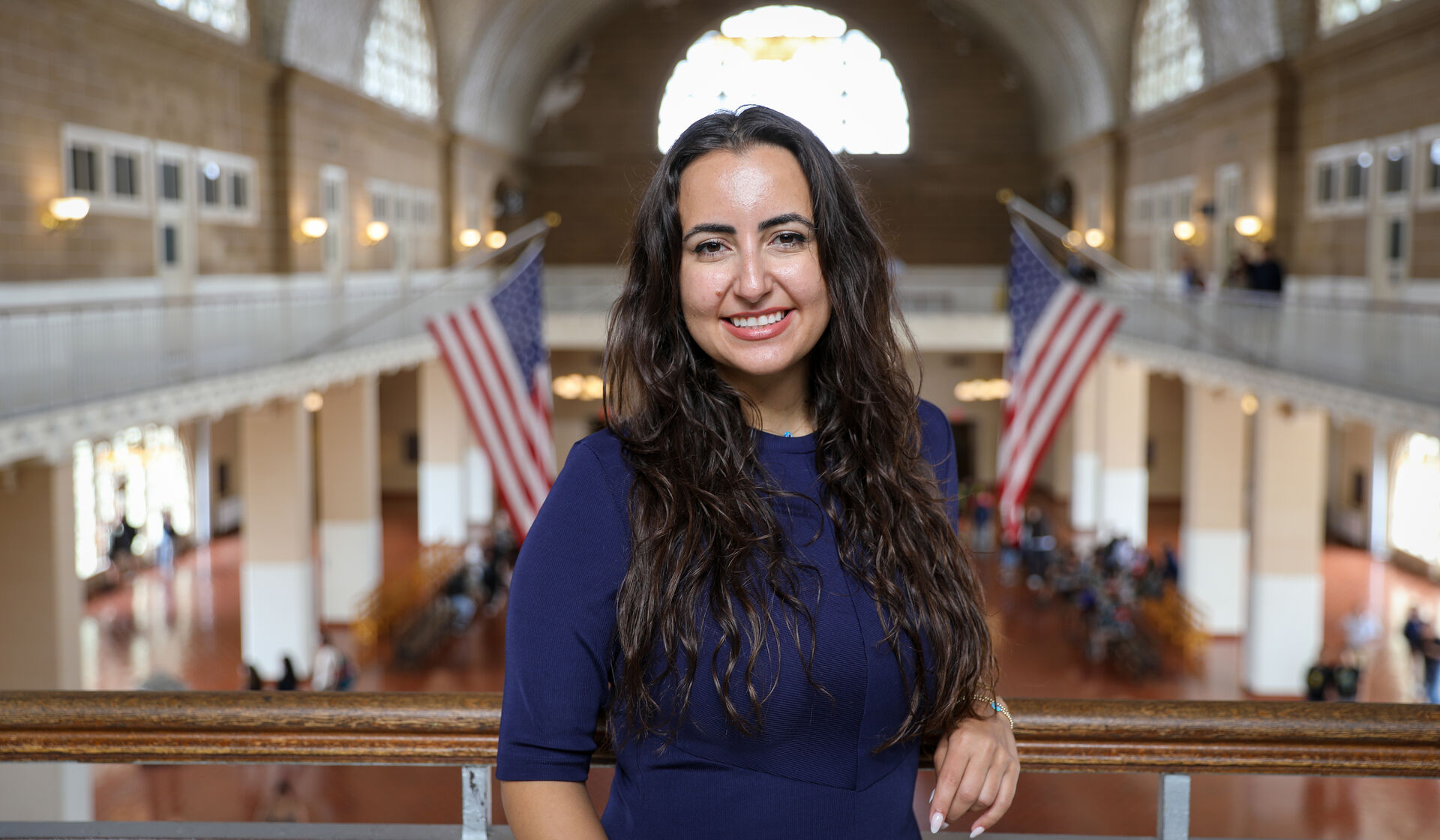Heeding her mother’s advice to “stand up and sing!” as a child has helped propel Jessye Norman into the highest echelons of the world of opera.
The term “diva” evokes a certain image of a female opera star. But Jessye Norman, MMUS’68, HSCD’87, enters the Cecil Restaurant in Harlem at exactly 5:58 p.m. for our 6 p.m. interview. She is without handlers or a public relations entourage as she smiles and says hello to several people she knows and then greets me warmly. We sit down at a small table by a window to discuss her career, her life, and that loaded word—diva.
“I have embraced it, which takes any sting or unpleasantness out of it,” she says with a voice that is deep, rich, and melodic, even when she is simply speaking. “I want everyone to be prepared and ready to do the work we are assigned and have agreed to do, and if that wish can be interpreted as my being a diva, then I embrace it. . . . My desire is in doing the best I can every time I go on to a stage.”
That is undoubtedly the attitude that has helped her become one of the most popular and well-known opera singers in the world. The fivetime Grammy award winner has also done a lot of speaking recently on a book tour for her memoir, “Stand Up Straight and Sing!” The title refers to some of the earliest advice she received from her mother, and the stories inside detail the extraordinary arc of her life—from growing up in the segregated South to performing before heads of state, European monarchs, and Rosa Parks when she received the Congressional Gold Medal from President Bill Clinton.
“My time at Michigan was a time of truly settling into adulthood and being, for the first time, away from people I knew well.”
In her professional life, Norman sings words written by others. So it’s a change of pace for her to pen her own story, but she says she was excited to do it. Instead of using a ghostwriter, she worked around a busy performance schedule, often staying up until daybreak to get the chapters written.
“Instead of editing or correcting myself as I went along, I just wrote it all down as though crafting a long letter to a friend,” Norman says.
An energetic speaker, she gestures often, causing large silver hoop earrings to swing in her ears. She is elegantly dressed—in a black shirt and skirt with an aqua jacket, a big aqua necklace, and a sparkly black headscarf—for an evening event she is headed to after our interview. And though she flashes her bright smile often as we talk, she doesn’t hesitate to correct if she disagrees with the premise of a question. I discover this when I say it is surprising she was drawn to opera as a child, suggesting it is not the type of music most young people grow up listening to.
“To say that people do not grow up with classical music in their ears is not true,” she disagrees, passionately, before making her point by sharing with me stories of some of the surprising places she has encountered fans. Like the time she was riding in the back seat of a car on her way to morning rehearsals when a man approached to squeegee the windshield. “The man looked into the car and said, ‘You don’t believe I know who you are, do you?’” she recalls with a smile, still clearly tickled by the exchange. “He says, ‘I’m not so crazy about the Wagner operas, but all the other things you sing I really like.’”
THOUGH HER TALENT IS NOW RECOGNIZED WORLDWIDE, in the beginning Norman says she was just one of many young voices beloved by her family and community in Augusta, Georgia.
“We were all encouraged by the adults around us,” she recalls. “But I was not given the impression that my voice was considered better than my friend next to me, and that was a very healthy way in which to grow up.”
Her love of opera started when she was young. While changing the stations on her small radio to find something to listen to while doing small household chores, she discovered a live broadcast of the New York Metropolitan Opera. She adored it from the moment she heard it and says her parents were always supportive as her love and pursuit of music grew.
She was offered a full tuition scholarship to the College of Fine Arts at Howard University for her undergraduate degree and followed up four years there with a summer session at the Peabody Conservatory before heading to the University of Michigan to get her master’s degree in music in 1968.
“My time at Michigan was a time of truly settling into adulthood and being really, for the first time, away from people I knew well,” Norman says. “In Washington, D.C., I had family members and lots of students from Augusta whom I knew before going to Howard. Things were different at Michigan.”
But Ann Arbor quickly became home. “State Street was a lively place, particularly on the weekends, and Metzger’s was a tavern that we students could afford. We also had a great friend and fellow student singer who worked for one of the pizza companies, and we would put our pennies together when we wanted a bit of fun and order a pizza that he would have to deliver and then we would keep him for an hour to talk. We had great fun.”
Concert pianist Barbara Nissman, MMUS’66, AMusD’69, was a graduate student whose time at Michigan overlapped with Norman’s. She says everyone who met the singer realized quickly she was destined for greatness. “I remember how hard she worked. Even though she had such a monster talent, there was a real seriousness of purpose. Her work ethic was extraordinary even then,” Nissman recalls. “People sometimes forget when you are born with such a huge talent it does take a lot of work to get it to the next level, and Michigan was a nurturing place to help her do that.”
Norman writes in her book of the growing understanding she received at U-M of how to control her breath, and she appears perplexed and surprised when I ask what else she learned while a student.
“Breathing is the very basis of performing,” she says, leaning forward on the table to emphasize her point. “Whether you are a dancer or singer or cellist, breathing properly is the basis of everything you do. When you understand that breathing is the very foundation of what you do and that to come to terms and understand that, you have learned a lesson for life. My studies prior to Michigan had taught me this, and it was wonderful to have this reinforced at such an important juncture in my training.”
TALKING WITH NORMAN IS A LIVELY EXPERIENCE, and she truly values the art of conversation, as did her parents. A love of education comes from them too. Her mother was once a schoolteacher and certainly was part of the inspiration for Norman to help found the Jessye Norman School for the Arts in her hometown of Augusta in 2003. The tuition-free after-school program serves talented middle school children who would not otherwise be able to afford private arts tutoring.
She is deeply invested and involved with the organization and proud of its impact. Though she is not married and has never become a parent herself, she writes in her book that when people ask if she has any children, she likes to say she has 103—the number of students attending the school. She gives much of her time to these young students and shares with them performance lessons she still lives by today.
“A real performer, I feel, gives as much attention to singing at Central Baptist Church as to singing on the stage of Carnegie Hall,” she says. “You cannot know what that performance might mean to someone in the audience. You cannot be burdened thinking about this, but it is important to know that, for someone, that performance is the first time they might hear you and maybe the only time they ever hear you. You should do the best you can. I say this to kids all the time—do all that you can on that day.”
Though she references her “kids” at the school, she does not discuss her personal life in her book or otherwise. She writes, “I love my men friends” and alludes to several marriage proposals she has received through the years but makes it abundantly clear when I ask that she views this as a private topic.
Her talent and career constitute her public focus, and she has received countless awards through the years, including those five Grammy awards, about 38 honorary degrees, a Kennedy Center Honor, and a 2010 National Medal of the Arts. “To be recognized in this way by the highest arts honor our country affords and to have had this presented to me by President Obama was certainly wonderful.”
Nissman says anyone who has followed Norman’s career can see she has done exactly what she was meant to do with her talent. “She shared it with the world and inspired people with it and touched so many souls,” she says. “And that’s what an artist is supposed to do, but so few have the boldness and work ethic to actually do it.”
Don’t think that since Norman wrote her memoir, she is now looking back on a life well lived or contemplating retirement. “My life is not about reminiscing. I’m still performing. It was Abraham Lincoln who said, ‘A tree is best measured when it is down.’ And my artistic tree is still growing. I yet have big dreams. Wild and wonderful ones.”
Jennifer Davis, ’95, is a freelance reporter and writer based in Washington, D.C.





